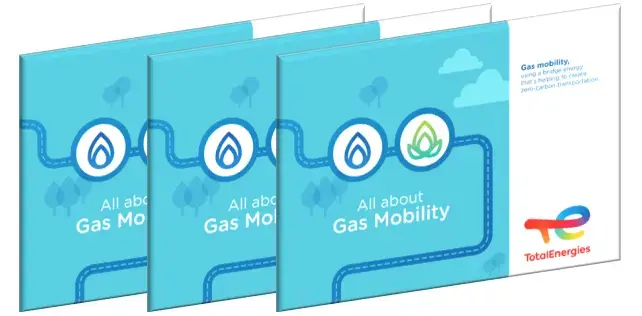CNG & bioCNG
CNG stands for compressed natural gas, which is a natural gas fuel stored at high pressure. It has been compressed to 200-250 bar and thus reduced to less than 1% of its volume at standard atmospheric pressure. This makes it easier to store and to transport.
CNG fuel is particularly suitable for passenger cars, light commercial vehicles, light trucks and buses. It offers trucks a range of around 550 km. CNG vehicles driving on biomethane emit significantly less particulate matter* and CO2** than conventional fossil fuels.
Production of biomethane
The renewable and non-fossil variant of CNG is biomethane or bioCNG. Biomethane is produced by fermenting biomass into biogas, which is purified and converted into grid quality gas. The biomass can consist of various types of raw materials, or feedstock, such as straw or tree bark and branches, or organic materials, such as food waste, roadside grass, sewage sludge and animal manure.
Biomethane to bioCNG
The biomethane, which consists of the same molecule as natural gas, namely CH4 or methane, is then injected into the gas grid. The natural gas is subsequently extracted from the grid and compressed by means of a CNG installation to be used as transport fuel. Biomethane can be blended or used up to 100% depending on availability and customer requirements.
Growing network of CNG stations
TotalEnergies strives to make alternative fuels that are cleaner and lower carbon available to as many users as possible. Today, TotalEnergies operates more than 1400 CNG stations world-wide.

All about CNG, LNG & Biomethane for mobility
TotalEnergies' CNG network overseas
In the Americas region, TotalEnergies, through its participation in Clean Energy Fuels in the US, operates more than 600 (bio)CNG stations.
In Asia, TotalEnergies, through its joint venture with India's Adani Group, operates more than 600 CNG stations today.
Product benefits
- Reduced vehicle emissions, such local air pollutants* and, especially when biomethane is used, less greenhouse gases**.
- Different types of CNG vehicles available on the market, from passenger cars to heavy trucks.
- A CNG engine runs more quietly than a diesel engine.
TotalEnergies offer
- A large European network with TotalEnergies and AS 24 stations.
- A growing network overseas, for example in the US through TotalEnergies' participation in Clean Energy Fuels and in India through the joint venture with Adani.
- Renewable CNG, also knows as bioCNG or biomethane, offer possibilities.
* A study on air quality from the Sustainable Gas Institute (2019), ‘Can natural gas reduce emissions from transport?’, shows that NGV engines provide a NOx reduction of between 40%-60% (depending on the type of road) compared to diesel, by using a simple clean-up system. For particulate matter (PM), NGV engines ensure as much as 95% lower levels compared to diesel, thanks to a soot free combustion (with no need for a complex after-treatment).
** According to the NGVA Europe & Thinkstep study (2017) on the ‘Greenhouse Gas Intensity of Natural Gas in Transport’ (2017), a reduction in CO2 emissions of up to 16% is achieved by driving on CNG compared to diesel for heavy-duty applications and calculated on a 'Well-to-Wheel' basis. Using biomethane increases this CO2 reduction to as much as 80%.